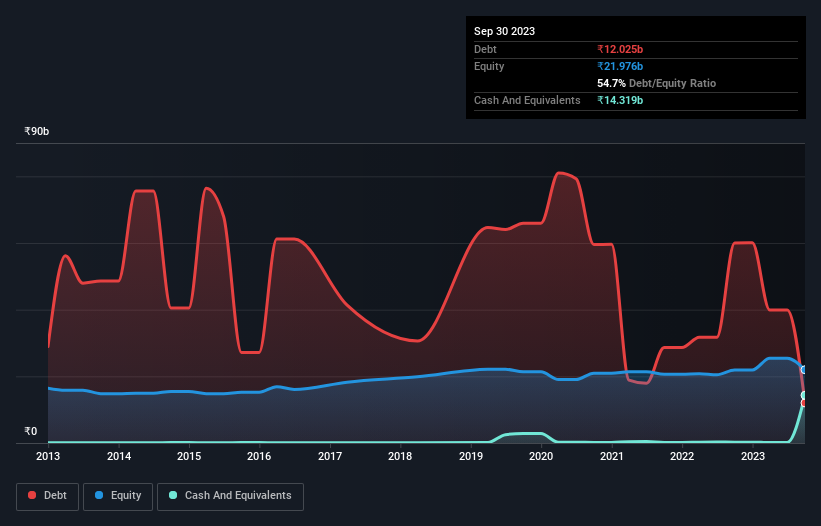These 4 Measures Indicate That National Fertilizers (NSE:NFL) Is Using Debt Extensively

Some say volatility, rather than debt, is the best way to think about risk as an investor, but Warren Buffett famously said that 'Volatility is far from synonymous with risk.' When we think about how risky a company is, we always like to look at its use of debt, since debt overload can lead to ruin. We note that National Fertilizers Limited (NSE:NFL) does have debt on its balance sheet. But should shareholders be worried about its use of debt?
What Risk Does Debt Bring?
Debt is a tool to help businesses grow, but if a business is incapable of paying off its lenders, then it exists at their mercy. Ultimately, if the company can't fulfill its legal obligations to repay debt, shareholders could walk away with nothing. However, a more frequent (but still costly) occurrence is where a company must issue shares at bargain-basement prices, permanently diluting shareholders, just to shore up its balance sheet. Of course, plenty of companies use debt to fund growth, without any negative consequences. When we think about a company's use of debt, we first look at cash and debt together.
Check out our latest analysis for National Fertilizers
What Is National Fertilizers's Debt?
As you can see below, National Fertilizers had ₹12.0b of debt at September 2023, down from ₹60.0b a year prior. However, its balance sheet shows it holds ₹14.3b in cash, so it actually has ₹2.29b net cash.

How Healthy Is National Fertilizers' Balance Sheet?
The latest balance sheet data shows that National Fertilizers had liabilities of ₹64.5b due within a year, and liabilities of ₹18.9b falling due after that. Offsetting these obligations, it had cash of ₹14.3b as well as receivables valued at ₹15.9b due within 12 months. So its liabilities total ₹53.2b more than the combination of its cash and short-term receivables.
When you consider that this deficiency exceeds the company's ₹42.0b market capitalization, you might well be inclined to review the balance sheet intently. Hypothetically, extremely heavy dilution would be required if the company were forced to pay down its liabilities by raising capital at the current share price. Given that National Fertilizers has more cash than debt, we're pretty confident it can handle its debt, despite the fact that it has a lot of liabilities in total.
Shareholders should be aware that National Fertilizers's EBIT was down 40% last year. If that decline continues then paying off debt will be harder than selling foie gras at a vegan convention. There's no doubt that we learn most about debt from the balance sheet. But it is National Fertilizers's earnings that will influence how the balance sheet holds up in the future. So when considering debt, it's definitely worth looking at the earnings trend. Click here for an interactive snapshot.
Finally, a business needs free cash flow to pay off debt; accounting profits just don't cut it. While National Fertilizers has net cash on its balance sheet, it's still worth taking a look at its ability to convert earnings before interest and tax (EBIT) to free cash flow, to help us understand how quickly it is building (or eroding) that cash balance. Happily for any shareholders, National Fertilizers actually produced more free cash flow than EBIT over the last three years. That sort of strong cash conversion gets us as excited as the crowd when the beat drops at a Daft Punk concert.
Summing Up
While National Fertilizers does have more liabilities than liquid assets, it also has net cash of ₹2.29b. And it impressed us with free cash flow of ₹66b, being 696% of its EBIT. Despite its cash we think that National Fertilizers seems to struggle to grow its EBIT, so we are wary of the stock. When analysing debt levels, the balance sheet is the obvious place to start. However, not all investment risk resides within the balance sheet - far from it. To that end, you should be aware of the 2 warning signs we've spotted with National Fertilizers .
When all is said and done, sometimes its easier to focus on companies that don't even need debt. Readers can access a list of growth stocks with zero net debt 100% free, right now.
Valuation is complex, but we're here to simplify it.
Discover if National Fertilizers might be undervalued or overvalued with our detailed analysis, featuring fair value estimates, potential risks, dividends, insider trades, and its financial condition.
Access Free AnalysisHave feedback on this article? Concerned about the content? Get in touch with us directly. Alternatively, email editorial-team (at) simplywallst.com.
This article by Simply Wall St is general in nature. We provide commentary based on historical data and analyst forecasts only using an unbiased methodology and our articles are not intended to be financial advice. It does not constitute a recommendation to buy or sell any stock, and does not take account of your objectives, or your financial situation. We aim to bring you long-term focused analysis driven by fundamental data. Note that our analysis may not factor in the latest price-sensitive company announcements or qualitative material. Simply Wall St has no position in any stocks mentioned.
About NSEI:NFL
National Fertilizers
Engages in the production and marketing of neem coated urea, bio-fertilizers, and other allied Industrial products in India.
Good value with proven track record.
Similar Companies
Market Insights
Community Narratives



